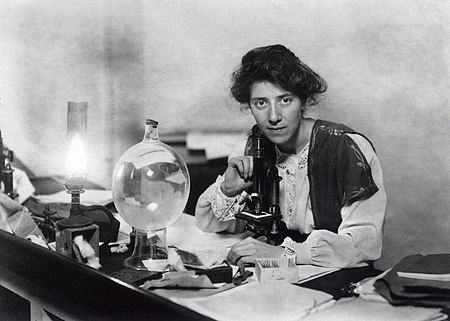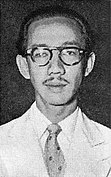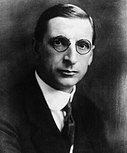Wikipedia:Main Page history/2023 March 9b
From today's featured article
Sumitro Djojohadikusumo (1917–2001) was an Indonesian statesman and economist. Widely considered to be Indonesia's most influential policymaker during his time, he joined the republican government during the Indonesian National Revolution after his economics education in the Netherlands. During Indonesia's era of liberal democracy, he served once as industry and trade minister and twice as finance minister. Unpopular due to his stance favoring foreign investment, he joined the insurrectionary Revolutionary Government of the Republic of Indonesia, operating from abroad as the movement's fundraiser and foreign minister. Following the movement's defeat, he remained abroad in exile until Suharto took power and invited him back. Appointed as trade minister in 1968 and research minister in 1973, Sumitro also established private business interests and a political presence for his family. After his departure from government in 1978, he continued to work as an economist until his death. (Full article...)
Did you know ...
- ... that tram service in Olsztyn (pictured) restarted after no trams had operated in the city for more than fifty years?
- ... that during the First Balkan War, the capture of Lemnos by the Greek navy enabled it to blockade the Dardanelles?
- ... that former CIA agent Bazzel Baz was hired to be a consultant for The Blacklist television series and instead became a cast member?
- ... that the folk ritual jailangkung originates from the Chinese practice of spirit basket divination and has been featured in Indonesian horror films?
- ... that shortly after his capture in 1918 British brigadier general Hubert Conway Rees was interviewed by Kaiser Wilhelm II of Germany?
- ... that dishes at the 1888-established Hacı Abdullah Restaurant in Istanbul are cooked in handcrafted copper pots?
- ... that Lieutenant Governor of Alabama Will Ainsworth started his career as a youth pastor before co-founding a hunting lodge?
- ... that Fortress of the Bear's founder raised pigs to prove he could take care of bears?
In the news
- In the Estonian parliamentary election, the Reform Party, led by Kaja Kallas (pictured), wins the most seats in the Riigikogu.
- Cyclone Freddy leaves at least 29 people dead in Madagascar, Mozambique and Zimbabwe.
- Bola Tinubu, of the ruling All Progressives Congress, is elected President of Nigeria.
- A train crash in Thessaly, Greece, kills at least 57 people.
- At least 67 migrants are killed in a shipwreck off the coast of Calabria, Italy.
On this day
- 1009 – The first recorded use of the name of Lithuania appeared in Latin in the Annals of Quedlinburg, written in Saxony-Anhalt, present-day Germany.
- 1842 – Nabucco, an opera by Italian composer Giuseppe Verdi that established his reputation, premiered at La Scala in Milan.
- 1847 – Mexican–American War: The Siege of Veracruz began, the first large-scale amphibious assault conducted by United States military forces.
- 1932 – Éamon de Valera (pictured), a dominant political figure in 20th-century Ireland, became President of the Executive Council of the Irish Free State.
- 1959 – The popular fashion doll Barbie debuted at the American International Toy Fair in New York City.
- Mary Anning (d. 1847)
- Qayyum Chowdhury (b. 1932)
- The Notorious B.I.G. (d. 1997)
Today's featured picture

|
|
Marie Stopes (1880–1958) was a British author, palaeobotanist, and campaigner for eugenics and women's rights. After obtaining a doctorate from the University of Munich, Stopes was appointed to the faculty of the Victoria University of Manchester, becoming its first female academic. She went on to make significant contributions to plant palaeontology and coal classification, assisting the British government with her coal expertise during World War I. From 1913, Stopes began writing on issues of marriage, parenthood and women's reproductive rights. With her second husband, Humphrey Verdon Roe, she founded the first birth control clinic in Britain. Her sex manual Married Love (1918) was controversial and influential, and brought the subject of birth control into wide public discourse. She was also a believer in eugenics, being described in her biography by June Rose as "an elitist, an idealist, interested in creating a society in which only the best and beautiful should survive". This 1904 photograph shows Stopes at work in her laboratory in Manchester. Photograph credit: unknown; restored by Adam Cuerden
Recently featured:
|
Other areas of Wikipedia
- Community portal – The central hub for editors, with resources, links, tasks, and announcements.
- Village pump – Forum for discussions about Wikipedia itself, including policies and technical issues.
- Site news – Sources of news about Wikipedia and the broader Wikimedia movement.
- Teahouse – Ask basic questions about using or editing Wikipedia.
- Help desk – Ask questions about using or editing Wikipedia.
- Reference desk – Ask research questions about encyclopedic topics.
- Content portals – A unique way to navigate the encyclopedia.
Wikipedia's sister projects
Wikipedia is written by volunteer editors and hosted by the Wikimedia Foundation, a non-profit organization that also hosts a range of other volunteer projects:
-
Commons
Free media repository -
MediaWiki
Wiki software development -
Meta-Wiki
Wikimedia project coordination -
Wikibooks
Free textbooks and manuals -
Wikidata
Free knowledge base -
Wikinews
Free-content news -
Wikiquote
Collection of quotations -
Wikisource
Free-content library -
Wikispecies
Directory of species -
Wikiversity
Free learning tools -
Wikivoyage
Free travel guide -
Wiktionary
Dictionary and thesaurus
Wikipedia languages
This Wikipedia is written in English. Many other Wikipedias are available; some of the largest are listed below.
-
1,000,000+ articles
-
250,000+ articles
-
50,000+ articles




